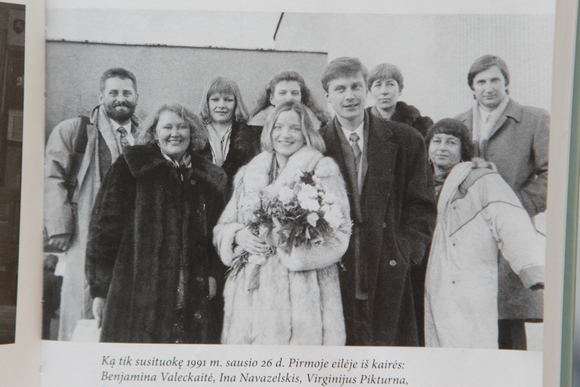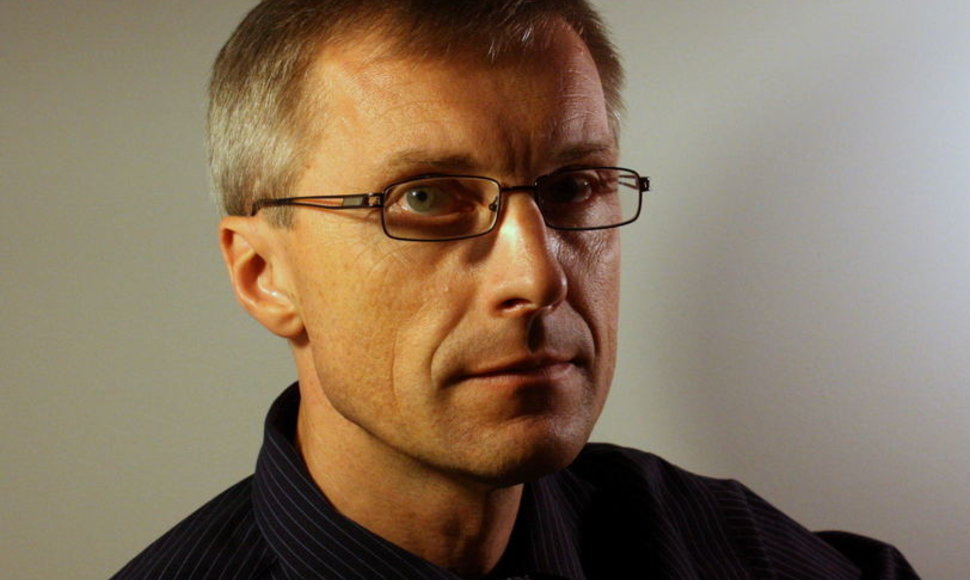- 22 years ago, on 11 March, you put your signature on the Act of the Re-Establishment of the State of Lithuania. What were you hopes and dreams back then?
- Reconstituting independence was our main goal, the hope of our parents and grandparents that the nation's freely elected deputies helped accomplish. We hoped we would work together, we dreamed of becoming free. I think it turned out just so.
The young generation can now hardly imagine how it was back then – the entire country at their radios or TV sets or surrounding the Supreme Council (the current Seimas), holding their breath and watching what was happening in the Lithuanian parliament. The run-up to 11 March was a celebration. It was hoped that the unity and solidarity we felt then would help lay good foundations for a new Lithuania.
Unfortunately, the road to independence soon turned bumpy and quite challenging for the Supreme Council–Reconstituting Seimas members. It's hard to tell whether a different road would have been safer, faster, demanding fewer sacrifices, but I'm sure that the Lithuanian people would have endured all the troubles and shortages better, had the Parliament not been polarized so early on.
11 March 1990 is the date that gave people a right to choose, to decide their own lives, to be independent. It's incomprehensible how sometimes officers and bureaucrats try to limit, to prohibit, to reprehend choices made by others.
I remember from 11 March 1990 the words by Jadvyga Bieliauskienė (she later headed the 13 January Society), uttered right after the signing of the Act. She was lean, clad in national costume, having endured the hardships of Siberia – she reminded me of my parents' generation that hoped to see an Independent Lithuania. Bieliauskienė's address from the stand was short and simple, yet deep and sincere: “Members of a free Parliament, let's be united, noble and we'll be free.” These words resonated with my inner feeling. I came up to her during a break, embraced and thanked her. I still remember the meaning of these words and I'll never forget it.
- You left four years later. Why?
- I was working in the Lithuanian Investment Bank at the time. The newly-formed national bank, headed by Vytautas Dūdėnas, was laying foundations for investment banking, the bourse, serving as expert in the operations of the foreign credits commission, appraising objects that were set to be privatized. I still become nostalgic remembering that period and our youthful enthusiasm, working 6-7 days a week. Unfortunately, the bank was closed by the end of 1993, due to political or other interests.
I still had some idealism left. I remember how once two politicians came to the bank and asked for a credit just like that. I replied it was up to a commission that must first look into and evaluate investment projects. The guests snapped out: “Are you off your trolley? Don't you know how these things work? You give us a credit and receive 10 percent, that's how all banks do it.” I don't know how much it was true about “all banks,” but it seemed that both parties of the encounter were shocked, I wonder which one more!
My leaving the country was, in a way, a protest, but now I see that it allowed me to acquire international experience, to compete and test myself in the labour market.
- You said four years ago that there were two roads leading from Prague where you were working: to join your family in Washinton D.C. or to return together with them to Lithuania. You chose Washington?
- Yes, it will soon be four years since I've been working in the Washington headquarters of Radio Free Europe/Radio Liberty. My wife and daughter had already been living in Washington and I realized that my daughter needed a father constantly and not just in summer (she'd spend holidays with me, in Prague), so I started to scout for a job in the US. When my bosses discovered that, they offered me a transfer to Washington. Me and my family settled in Virginia, close to Washington D.C. We chose a place that would be good for my daughter, in a town with many good schools and a nice setting. It was closed to a metro line, cycling and pedestrian paths of over 60 kilometers long.
- You were involved with politics in Lithuania, but later said you wouldn't want to be a politician. Why did you distance yourself from it after you left?
- I was working in the parliamentary commission on education, culture and science, I was vice-chair for parliamentary relations with Germany, was part of the liberals' group, served in the board of the Liberal Union. Work in the Parliament brought disillusionment. Divisions, mistrust, looking for enemies weren't part of my (or other', I believed) program for Lithuania. I look at it differently now: it probably is part of political life that makes up the basest and worst aspect of political culture.
On the other hand, history shows that the best and most creative stage of all revolutions and reforms takes place before the winning of power. The most important challenges come afterwards. There follows a less spiritual period that for many people is painful and hard. I didn't want to stay in politics anymore, values having radically changed and idealism replaced by fight for interests and influence. I felt I could do more good if I retired from politics.
- Let's talk about something more pleasant. When was your last visit to Lithuania?
- In August 2009. They were exceptional three weeks, I felt wonderful. I like being in Lithuania, it gives me energy – be it while rowing a boat in the lakes of Ignalina, canoeing up the Venta or Minija by the Mingė village, or cycling from Palanga towards Klaipėda or Šventoji. Several years ago, me and my friends discovered an unfamiliar hill fort near Tverai and in Palendriai - a Benedictine monastery. I'm attracted to see such places every year. I don't know any other place where you could walk barefooted under rain - we did walk admiring the banks of Babrungas. Lithuania is a cosy and gorgeous place, even though it seems at times that we don't appreciate what we've got.
- At around that time, 3 August 2011, you lost your citizenship because you had two - Lithuanian and American. How did you take it?
- When I discovered it, I spent long hours walking down the streets of Washington, around the Lithuanian embassy. I then realized what hundreds if not thousands of other Lithuanians, who had their citizenships taken away, were going through. When I recovered a little, I pulled myself together and said to myself: being a Lithuanian is my born right and no one can take that right away from me.
- What's the story of our double citizenship?
- It's simple. I decided to take American citizenship only after it was no longer against Lithuanian laws. A law, adopted in 2002, allowed for a US passport after 1 January 2003. My employers started paperwork for the US citizenship, hoping I'd get it within a year - i.e., mid 2003, as such procedures usually take over a year. However, the US authorities were unusually quick and gave me my citizenship in November 2002. My only solace was that when I lost my Lithuanian passport, my daughter was finally given one.
- You are a signatory of the Independence Act and were awarded the Independence Medal. Was this fact taken into account?
- I never mentioned I was a signatory and they might have been unaware of it. Of course, later I was told in the Migration Department that I should have appealed to the President or someone else, because there's an exemption. But I think there shouldn't be any exemptions.
- So you've probably given up all plans to return?
- That's not a reason for door slamming. I only see myself in Lithuania. When one has a family, especially a kid, there are certain responsibilities and it's not that easy to move. I've said that once my daughter goes to college, I'll come back to Lithuania.
- Your ex-wife, Ina Navazelskis, recently published a book about events in Vilnius 1990-1991. Have you read it?
- Yes, of course. I've read numerous time the original reports in English. I'm probably justified in saying that I was one of the people who encouraged Ina to translate and publish them in Lithuania. These are authentic materials by a professional journalist with a lasting value, especially historical, because the reports are objective, unbiased towards any political group or government. Our history of Independence often gets skewed and politicized. Historians must be having tough times sorting it all out.
By the way, I'd like to come back to the 11 March 1990 and add that it's the date that gave people a right to choose, to decide their own lives, to be independent. It means that no one can restrict your rights any loner, make decisions for you. It's incomprehensible how sometimes officers and bureaucrats try to limit, to prohibit, to reprehend choices made by others. For instance, ones by a famous athlete who wants to represent another country in the Olympics (referring to Donata Rimšaitė who's taken up Russian citizenship but was not allowed by the Lithuanian National Olympic Committee to represent Russia in London Olympics). That is her choice. It is not up to sports functionaries to decide, to ruin her life or accuse of lack of patriotism.
In democratic systems, it is the state that serves its citizens, its people, not vice versa. That is not to say that citizens have no responsibilities. But these responsibilities come from an imperative not to betray one's country to those who wish it harm.
 |
| Asmeninio albumo nuotr./Virginijus Pikturna married Lithuanian-American journalist Ina Navazelskis on 26 January 1991 |
Facts of biography
Virginijus Pikturna was born on 23 March 1961 in Jurjonai village, Klaipėda district. He went to school in Palanga, graduating from the Lithuanian Academy of Agriculture in 1984. From 1985 to 1990 he was secretary at Kretinga district Komsomol organization, was part of Lithuania's Culture Foundation group in Kretinga district, the Green movement.
1990-1992 deputy of the Supreme Council of Lithuania-Reconstitutive Seimas. 1992-1993 vice-president and board member at the Lithuanian Investment Bank. 1994-1995 he studied and worked as a consultant in Maastricht and London. 1995-1997 fellow of NATO Democratic Institutions research program. 1995-1997 head of monitoring group at Open Media Research Institute (OMRI). 1997-2007 head of information and analysis department of Radio Free Europe/Radio Liberty in Prague (Czech Republic), since 2008 same position in central headquarters in Washington D.C.












